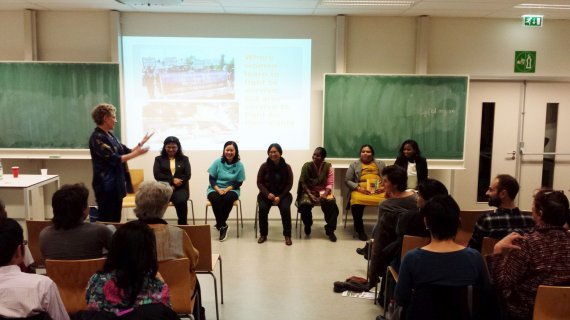‘It is not worth it’, said the six female activists from Asia and Africa that spoke at the Leeuwenborch yesterday. They explained how they tried to convince women back in their home country to go back to using traditional methods to farm, without pesticides and fertilizers. The stories of the female activists were touching. It seemed that the fight for an agro-ecology approach was part of a much larger struggle: for women’s rights.
Gracy Valliamat from India explains about a group of women that belong to the lowest caste in India, the Dalit. For years they fought to become owner of a piece of land. The government official promised a piece of land to the women, but without land title. After a lot of haggling he said that he wanted to give the land title, but then he wanted one of the women. Sounds of outrage and disgust were heard in the room, but Valliamat, with a big smile on her face, was not finished with her story. ‘They agreed’, she said. More amazement from the room. ‘The officer was brought to a room and was told: you can choose a woman. When he entered he was awaited by a group of women who attacked him with brooms and slippers. He fled and still gave them the land title.’ This anecdote of a rare victory of one of the most suppressed groups in India – the women of the lowest caste – was of course welcomed with applause. And Valliamal had more good news. ‘These women now even give training to men about using traditional seeds and agro-ecological farming methods.’
When he entered he was awaited by a group of women who attacked him with brooms and slippers
Gracy Valliamal, activist from India
The activist Ponniah Logeswary from Sri Lanka told a similar story. She belongs to one of the most marginalized groups in Sri Lanka, she explained. Namely from South- India originating Tamil, who were brought to Sri Lanka by the British to work in the plantations. ‘We only have civil rights since 2003. On paper. In practice the government is still racist.’ But that does not stop her from travelling from village to village to teach women about agro-ecological farming and leadership. ‘To build a feminist movement you have to start with the poorest, most suppressed, landless women’, also Gertrudes Ranjo-Libang from the Philippines said. ‘They have the will and the urgency. We teach them how to be leaders’, she said inspired. Also female activists from Senegal, Malaysia and Vietnam shared their story and answered questions from Wageningen students.
‘This shows how difficult it is. We are committed to women and agro-ecology, but there is much more to it’, concluded Edith van Walsum, director of Ileia. For this event, this Wageningen based organization worked together with Boerengroep, RUW and Otherwise, three student groups that often work together to organize ‘Grassroots science’ meetings.

